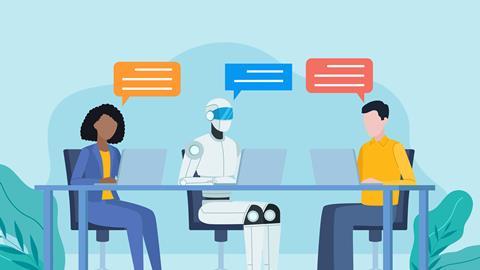Legal AI has progressed to an essential productivity tool that can take on specific roles within a legal team – should human lawyers be worried?
Agentic AI is moving beyond functionality and workflows to take on specific roles in corporate legal teams. It is improving productivity without increasing headcount and extending their capacity to retain legal work in-house and rationalise their external legal spend. Legal AI is indeed starting to replace lawyers.

This is reflected in LexisNexis research into the total economic impact of just one product, LexisNexis Lexis+AI for corporate legal departments. This revealed up to a 13% reduction in work handled with outside counsel and a 25% reduction in time spent advising the business on legal enquiries, as well as annual time savings of 50% for paralegals on administrative tasks. This week, LexisNexis launched its personalised agentic AI assistant Protégé in the UK, following its strategic alliance with GenAI platform Harvey announced last month, bringing together agentic AI and legal research to further boost productivity.
Crossing the productivity chasm
The AI productivity boost was highlighted in a recent article by Danny Fortson in The Times featuring Luminance, an AI tool used by large corporations to speed up contract review, revision and negotiation, as well as litigation support. Luminance uses GenAI to automate time-consuming tasks such as contract review, as well as more sophisticated processes such as contract negotiation. The agentic capability of popular GenAI offerings Harvey and Legora allows them to manage legal workflows, automatically selecting the right tool for different processes. This is saving lawyers’ time, which is great for corporate legal teams, which are notoriously under-resourced. Luminance CEO Eleanor Lightbody described the introduction of large language models into legal AI systems as the moment when legal AI ‘crossed the chasm’ from a nice-to-have to an essential productivity tool. But this brings operational challenges for law firms.
Shifting expectations
GenAI is shifting client expectations. While law firms are urged to ‘embrace’ GenAI, they are also expected to pass on the productivity savings from their GenAI investments to clients. George Niño, US legal head of industrial automation giant Yokogawa, told The Times that he expects to pay less for external counsel. ‘With some of our leading law firms, who charge anywhere from $1,300 to $1,700 an hour, it’s not just a request, but an expectation that they leverage these AI tools to reduce our legal spend,’ he said. He later reported on LinkedIn that firms had complied with his request.
'If you have a question about a new piece of legislation, or whether a particular type of document is legally binding, it’s quicker to just ask ChatGPT, especially if you know the area of law. But you have to check the output, even if it looks right'
Anthony Kenny, GSK

GenAI is flipping the law firm/client paradigm by enabling corporate legal teams to handle more work in-house, particularly for organisations that use AI in their core business. Anthony Kenny, assistant general counsel corporate and CBS at GSK outlines the GSK legal team’s three main uses of GenAI: ‘We use GSK’s internal digital assistant GiGi, which is similar to ChatGPT, to search internal policies. You can get it to do translation, document analysis and emails. Second, more of us are getting Microsoft Copilot, which has the whole integration into Microsoft 365. And third, we use ChatGPT for general queries. Obviously, in-house legal teams can’t upload any documents to ChatGPT, but if you have a question about a new piece of legislation, or whether a particular type of document is legally binding, it’s quicker to just ask ChatGPT, especially if you know the area of law. But you have to check the output, even if it looks right.
‘You have to remind yourself that it’s an algorithm, so you need to check the source and the conclusion, but it’s still quicker than finding the source materials yourself or going out to external counsel… which involves an internal approval process, even if you have a standing arrangement which means you don’t need a letter of appointment.’
Upskilling
One question that comes up repeatedly in relation to GenAI is how will junior lawyers learn their craft if AI is automating the routine tasks that were previously used to train them. The solution, unsurprisingly, involves GenAI. Luminance CEO Eleanor Lightbody has explained that because Luminance shows how users addressed things in the past, it is helping to upskill inexperienced junior lawyers. AI paralegal Wilson is more proactive. Because it is part of the legal team, human paralegals and trainees can ask it questions in the same way they would ask a colleague. Wilson will never be too busy to respond. Wilson AI recently hosted a webinar for Flex Legal trainees on best practices for using AI to review contracts, how to use citations to make sure things are not ‘hallucinated’, and how to be AI champions in their organisations.
From automation to team player
Sophisticated AI agents are fulfilling roles that previously required people. Wilson is an AI paralegal which works within corporate legal teams. Like a junior employee, it requires clear instructions, and learns from experience and feedback. WilsonAI co-founder Gus Neate, who trained as an engineer before qualifying as a lawyer and working as an associate at Clifford Chance, explains that lawyers can delegate tasks to Wilson in the same way as they would to a junior lawyer or paralegal. Wilson can interrogate the company’s legal knowledge base, handbooks, policies and playbooks; it can review and mark-up documents and contracts, and send emails. For example, you can ask it to review and (once it has been checked) send out a non-disclosure agreement.
As with all GenAI tools, you have to check its work, as you would for a human paralegal, and feedback helps it improve its output. Wilson is a digital colleague that also works with other paralegals and integrates with other tools and platforms. It can join a Slack discussion, where (human) paralegals can interact with it and ask questions, for example about a contract, workflow or process.
Mark Tyler is chief operating officer and general counsel at crowdsourced investment platform Crowdcube, whose legal team has three main use cases for Wilson AI: ‘Our commercial team is talking to companies all the time and asking us questions. The answers to 75% of those questions are part of an evolving set of policies and procedures. Wilson knows those policies and procedures, so the commercial team asks Wilson first and only comes to us if we need to clarify the policy, in which case we update Wilson too, or if we have to intervene to make an exception.’
A big advantage of Wilson is that it produces written responses. ‘In particular, if we are saying “no” to a company, they want to know why,’ Tyler says. ‘For example, we don’t generally invest in subsidiary companies.’ The second use case is reviewing due diligence materials for companies that are raising funds. ‘So if we get a new shareholders’ agreement, Wilson knows our requirements and will read the documents and make suggestions.’
The third use case involves reviewing company documents for a new fundraise. ‘We have trained Wilson on our most common corporate actions,’ he adds. ‘For example, we might get a 120-page shareholder agreement, and we have trained Wilson to find how something affects shareholders. There is always a human review when we use Wilson, but it still saves us time. We are basically using Wilson to scale. We do 200 raises a year, and we talk to thousands of companies that don’t pass our due diligence processes.’
How do the human paralegals feel about Wilson? ‘They love it,’ says Tyler. ‘It is seen as a complementary tool which allows them to do higher-value, more interesting work. And we have not reduced our headcount as a result of using AI. It has simply allowed us to do a greater volume of higher-quality work.’
Productivity v critical thinking
Salesforce CEO Marc Benioff has paused hiring engineers, lawyers and customer service agents so that the company can ‘let AI productivity really take hold’.
Neate explains that Wilson and other AI productivity boosters mean that businesses can scale up without expanding legal teams, and company lawyers gain deeper insights into the business (as well as saving external legal costs) by handling more work in-house. ‘The winner is the internal user,’ he adds. But what does that mean for lawyers’ jobs?
Kenny at GSK ‘can see a big chunk of legal work falling away’ as AI automates more of the work that lawyers do. ‘So as a profession, we need to ask ourselves: what is our role as lawyers?’ he says. ‘In addition to the rule of law, it’s all about judgement, advice, empathy, and the links we build with each other and our clients.
‘AI is good at answering questions, but a lot of law is about asking questions. Lawyers have the ability to ask the right questions, and to think about what’s behind the question – the political dynamic, which is a human dimension.’
The big question is that if AI improves to the extent that lawyers can rely on it, will their creative problem-solving abilities suffer? Kenny observes: ‘The current generation of lawyers is in a sweet spot. We have the opportunity to use AI to enhance our knowledge and experience. Whereas the generation coming through will be super-productive, but they may be missing underlying skills.’
































2 Readers' comments